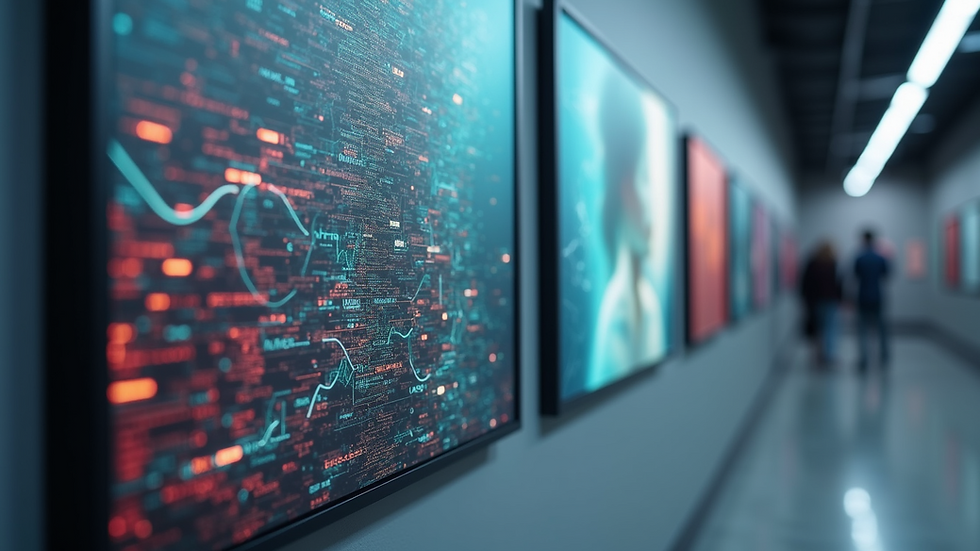Is AI Taking Over Our Lives or Just Making Them Easier
- EchoWave

- Apr 23, 2025
- 3 min read
Artificial Intelligence (AI) has moved from science fiction into our everyday lives. With voice-activated assistants like Siri and Alexa and smart algorithms predicting our shopping habits, AI is changing how we use technology. As we witness the growth of AI, we must reflect: is it truly simplifying our lives, or is it slowly taking over them?
AI is now woven into nearly every aspect of our routines, from improving efficiency to enhancing accessibility. However, while we enjoy these advancements, it's important to question the extent of AI's role in our daily affairs.
The Rise of Personal Assistants
Voice-activated personal assistants have become essential in many homes. For example, 61% of smartphone users now rely on these tools to manage everyday activities. They help us set reminders, control smart home devices, and quickly answer our inquiries. When you ask, “What’s the weather today?”, or command, “Play my workout playlist,” these assistants significantly simplify our lives.

Despite the convenience, there’s a downside. With easy access to answers, there’s a risk we might rely too heavily on technology for information. This reliance can lead to a decline in our problem-solving skills and reduce meaningful interactions with others.
AI in Business Tools
In the business world, AI-driven tools boost efficiency and productivity. For instance, AI-powered chatbots are projected to cut customer support costs by up to 30%. Additionally, automated data analysis helps organizations make quicker, more informed decisions.

While these tools bring undeniable benefits, they raise important questions. Are we undervaluing the contributions of human workers? Moreover, as AI takes on more decision-making roles, how much control are we willing to give up? Striking a balance between AI efficiency and human involvement will be critical.
AI in Entertainment
AI plays a significant role in the entertainment industry. For example, Netflix reportedly claims that over 80% of the shows people watch are determined by their recommendation algorithms. This technology helps tailor content to our preferences, making it easy to discover new favorites.

However, as AI curates content, there is a risk of creating a homogenized cultural experience. If algorithms dictate our media choices, we might miss out on diverse storytelling and unique artistic expression. It is essential to remain aware of how these systems influence our viewing and listening habits.
Navigating the Ethics of AI
As AI becomes more integrated into our lives, we face vital ethical considerations. Privacy issues often arise when AI collects personal data to enhance experiences. A 2022 survey found that over 70% of consumers are comfortable sharing their data for better services, but many lack awareness of the potential risks involved.
Transparency regarding data usage is essential. Users should understand how their information is used and the possible biases present in AI algorithms. Establishing ethical standards for AI development will help ensure that technology serves humanity rather than diminishes it.
The Unseen Hand of AI
A notable aspect of AI's integration is its subtle presence. Many AI systems work quietly in the background, influencing our decisions and suggestions without drawing our attention. Algorithms shape our social media feeds, music playlists, and online shopping experiences, often without us realizing it.
This hidden influence can be both beneficial and problematic. While it allows for seamless experiences, it also raises concerns about the extent to which unseen forces shape our choices and preferences. Staying aware of these influences will help us maintain control over our decisions.
The Future: Coexistence or Conquest?
As AI technology continues to evolve, we must ask what the future holds. Will AI enhance our creativity and social interactions, or will it take over our daily functions? The answer lies in our ability to find a balance. Embracing AI's advantages while staying in control is crucial for our future.
Maintaining human oversight will help ensure that technology enriches, rather than replaces, our life experiences. By fostering a healthy collaboration between AI and humans, we can harness innovation while maintaining our unique human touch.
Final Thoughts
AI is undoubtedly simplifying many facets of our lives, from personalized services to increased productivity. Still, we must consider the costs of this reliance. As we navigate a world increasingly influenced by AI, it's important to remain vigilant. We should reflect on whether we are enhancing our lives or giving up control to intelligent systems.
By embracing these technological advancements, let’s strive to ensure that AI-driven innovations support creativity, critical thinking, and authentic connections, rather than overshadowing them. Ultimately, the future of AI is about convenience, but it is also about preserving our humanity in a rapidly changing landscape. Are we ready to face this evolving world? Only time will reveal the answer.








Comments